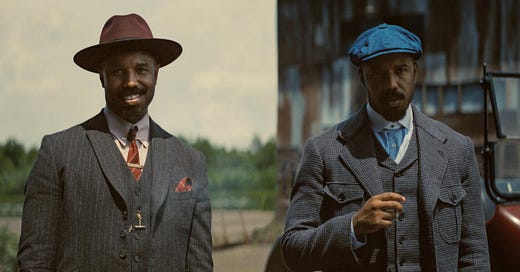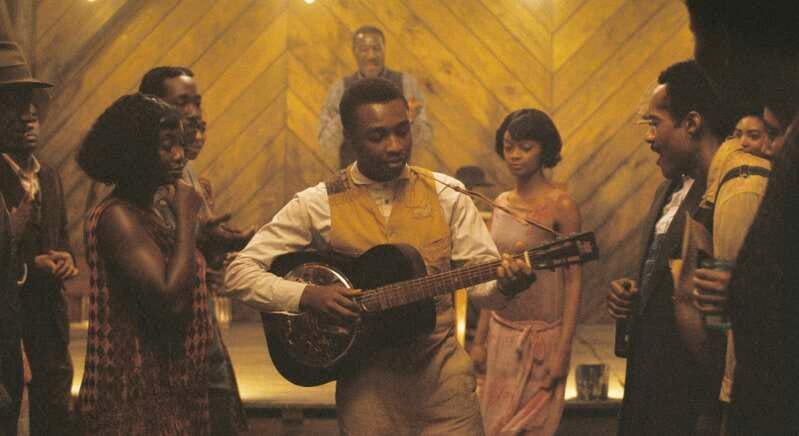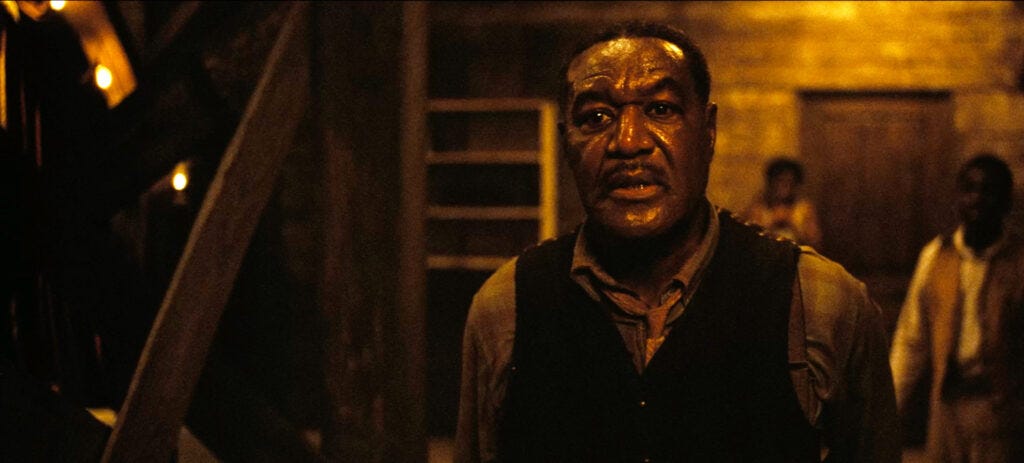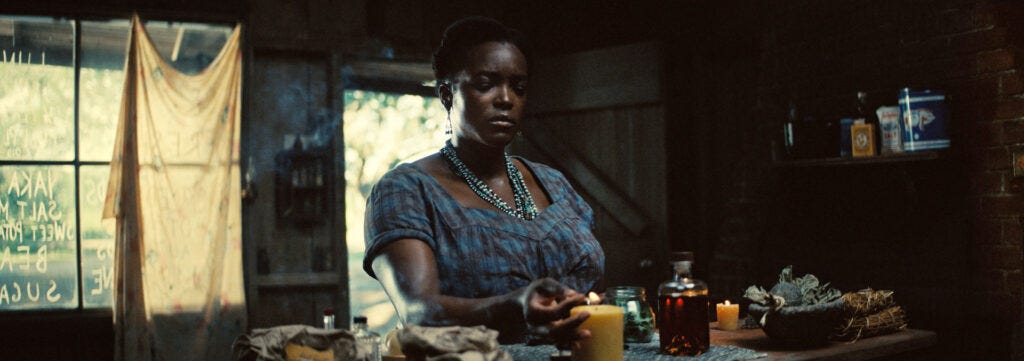Sinners (2025)
A feverish Jim Crow-era morality tale where the blues might get you by the throat
Michael B. Jordan becomes a powerhouse in a dual role: “Stack” (l.) and “Smoke” (r.)
Sinners (2025)
In theaters
This is a spectacular visual undertaking for writer-director Ryan Coogler, who also made Black Panther (2018) and Wakanda Forever (2022), both set in a frenziedly imagined future.
Here, earthbound and inspired by the Black musical past, he’s working with a rich historical palette. He’s riffing on a flowering of legendary delta blues in a virulently racist 1932 Mississippi.
The beauty he can thread though scenes of stark, unforgiving realism can be both joyous and jolting. He sets out to throw a party as well as curdle your blood, and I’m not sure we’ve seen such a contradictory blend on the scale Coogler attempts in this, only his fifth feature.
I say “only” because most movie directors’ skills evolve over decades of work, and at 38 Coogler is now entering what often turns out to be the early middle stage of a director’s career.
Coogler’s drive here has a hectic urgency. You can see he’s deftly mastering camera techniques, yet both his writing and directing continue to dart and swoop in a boyish, headlong rush.
This is a guy who still wants to play around with movie making tools, to discover how he can bend them to his will. Great subjects haven’t burrowed into his imagination yet.
In Sinners’ action-crammed sequences I often swooned, then began jumping in my seat trying to keep up with the bloodletting. Which is fair enough for a story that wriggles from rapturous musical and historical remembrance to vampiric horror show.
Music thrills Coogler and fright delights him. So be it. In his mind, Black music can slither from hypnotic to terrifying, but I think this jarring notion that the blues can also invite murderous blood-sucking isn’t entirely thought through.
The story opens on Sammie (Miles Caton), a young blues guitarist who doesn’t understand the power of the music that fascinates him. He’s the son of a local preacher (Saul Williams) who warns him his devotion to music is “sinning”.
When one morning Sammie’s twin cousins “Smoke” and “Stack” – both portrayed, thanks to CGI, by Michael B. Jordan – return to the South from WWI’s trenches and Al Capone’s Chicago, they take him under their wing.
He fits right into their scheme to buy, with their gangster money, an abandoned sawmill from a white owner and turn it into a juke joint set to open that very night.
Screen newcomer Miles Caton as Sammie, who comes into his own on a fateful night
It will cater to the Black community. Those gathering around the ambitious twins include Mary, a mixed-race ex-girlfriend of Stack’s (Hailee Steinfeld) and Annie (Wunmi Mosaku) an estranged wife of Smoke’s. Before the night is over both men will declare their love for these women they once abandoned.
And Delta Slim (Delroy Lindo), a pianist and blues harmonica wizard, will liven up the scene and make sure the gathered instrumentalists make the blues playing downhome authentic.
Early in the evening the joint is jumping, and Coogler lifts the revelry up out of the plot into a fantasia, a visual amalgam of Black music’s incarnations across centuries, up to our own time.
As the camera floats across this suddenly fantastical sequence, we see African griots, jazz syncopators, hip-hop DJ’s spinning turntables, break dancers in sharp leisure suits, Afrofuturist glamour pusses in billowy capes and dark glasses, even a Black classical ballerina.
They all sway and writhe, blues beats thrumming under them, seeming to “bless” their coming together.
But I was more puzzled than swept up in this gaudy intermingling. It all seems meant to suggest a centuries-spanning cultural “unity”.
No. Music isn’t a milkshake. You can’t pour genres and eras into a blender and press “ON”. Of course, Black musicians remembered and learned from African drumbeats, but the sounds they adapted from them, purred, shouted or pounded out, served different needs at different times.
There’s no question that gospel has roots in African rhythms, so do ragtime, jazz, blues, rhythm and blues and hip hop.
But these forms grew out of one another, across time, not alongside one another. That would have been impossible. They never coalesced.
What made them powerful was the way they spoke to a particular era and then gave way to fresh musical forms as times, inevitably, changed. What makes Black music indelible isn’t that it shares a single origin or carries the same rebellious, protesting message.
Its legacy is that music from past eras remains translatable to listeners and can speak to the tribulations of many eras. Musicians and listeners do the actual linking. Music itself needn’t, as Coogler seems to suggest, be hammered into some long, single “uplifting” chain.
Leave the forging of power connections to musicians. Listen, for example, to no less than the Empress of the Blues, Bessie Smith, sing “Alexander's Ragtime Band”, a song inspired by a Black band leader but written by a Jewish American immigrant, Irving Berlin.
Does anyone imagine that Smith hesitated to sing it because Berlin was white? The blues inflections she gives it answer: Don’t be ridiculous. She knew a great song when she heard it and knew how to make it her own. That’s musicianship. Art and craft, not simply a desire to please, though please she certainly does.
We see that gift here in Caton who, in the role of Sammie, is a real vocal and instrumental find; and in Delroy Lindo who as Delta Slim gives piano and harmonica playing a shivery blues thunder.
But for all the marvelous playing and singing throughout the movie, Coogler doesn’t want to confine his story to that incantatory realm.
Sure, his script fleshes out Smoke and Stack’s painfully recovered relationships with the two women they left behind and ultimately gives Sammie a personal revelation that can carry him into a musical future beyond racist Mississippi.
But as the night wears on and the partying gets looser and more funkily carnal, up pops the Devil, in the form of vampires.
Why are they here? Led by Remmick (Jack O’Connell), three white musicians show up at the door toting their stringed instruments and asking to be let in.
To show they can stomp a foot with the best of them, as they’re kept outside, they pour forth a lovely bluegrass/Irish ditty that even gets Smoke and Stack bobbing their heads and Delta Slim acknowledging, “They’re good.”
But Annie, who’s adept in herbal healing and wears a small mojo – secretly powerful – bag on a leather strap around her neck, cautions the others that something about this trio doesn’t feel right. She persuades Stack and Smoke not to let the white would-be revelers in.
The interlopers quietly stand back but before turning to walk away pledge that they came in fellowship and believe in “equality”. From white mouths in rural Mississippi those words ring false.
Indeed, they are. Before long the trio has returned, this time with dozens of singing, prancing Irish enchanters, step dancing and whirling in menacing throngs. Now as Remmick approaches the door there’s no misreading his eyes, gleaming with the glassy red of a vampire, and his teeth have turned to glistening fangs.
“I want your stories. And I want your songs. And you can have mine too,” Remmick purrs soothingly. Do these vampires symbolize a white musical establishment that exploited Black musicians?
Twice I’ve had the pleasure of watching a genuine blues legend perform. I saw the smiling, slyly bawdy Lightin’ Hopkins and the growling indomitable Big Mama Thornton produce more than music. They were instructing anyone paying attention in the ways that life, when it seems like reality might wipe you out, can be risen up against, fought to a draw, endured.
The script is tantalizingly hazy on the point. Annie, able to read the white visitors’ minds by now, concludes that the music being played in the juke joint – the cherished blues – has summoned this evil.
The battle is on. And the characters we hoped to understand better won’t get to show us more of what’s inside them – except the blood the assaulting vampires bite into their flesh to feast on.
This is all staged with an alarming, gruesome gusto. The flesh eating and the crimson oozing, that is. And of course, the camera zooms in on every slashed face and spurt of sticky blood.
I wanted to feel that I was witnessing the sad destruction of a by-us-for-us Black enterprise, a juke joint that uplifted hardworking people who badly needed a few hours respite and a good time.
But in the mayhem, I didn’t feel Black pride being fought for and tragically beaten into the dust. These Blacks facing down vampires weren’t taking a stand against white supremacy, they were fending off spirits, whose power would disappear with the rising sun.
Getting through the night is what the screenplay symbolically settles for as an uplifting message.
But white plantation overseeing and exploitative sharecropping were indeed slowly consuming Black flesh, indeed had harnessed it for centuries, for profit.
That was all accomplished by a massive, relentless, bottomlessly cruel American system, not some inchoate “evil”. Coogler's reducing that powerful economic and social reality to a one-night horror fest isn’t as illuminating as he seems to believe.
Nor, I’m guessing, is it as cathartic as he hopes it will be for audiences. I felt almost no sense of triumph for these beleaguered people of color. But the movie is so craftily put together, many moviegoers, of all races, may take away some sense of retribution or a historical score being settled.
Be that as it may, the performances deserve high praise.
Jordan handles his dual role mostly with a restrained, potently masculine, aplomb. Occasionally his flirty/dirty grins and menacing grimaces come off more smug than self-confident. But overall, he makes us feel that both brothers suffer painful consequences for their actions.
Veteran Delroy Lindo as Delta Slim offers deeply resonant renditions of the blues
Delroy Lindo is a delight and a bristling musical provocateur as the seasoned blues veteran Delta Slim. Remarkably at ease in front of the camera, Lindo lets this ripe sensualist joyfully whoop and holler when the blues pours out of him, whether he’s performing it or explaining it to anyone wise enough to listen.
Listening hard to him is Sammie, portrayed with poise and a moving earnestness by 20-year-old gospel singer Caton, who’d never acted or played a blues guitar before. He makes a promising debut.
Wunmi Mosaku, with her wide-awake, piercing eyes, mesmerizes deploying Annie’s herbal and totemic practices and remedies. So grave, subtle and still is Mosaku’s performance, she can hold the screen without speaking and barely moving.
Wunmi Mosaku’s Annie brings a mystical wisdom to a tale of relentless terror
Cinematographer Autumn Durald Arkapaw, a regular Coogler collaborator, casts a witchy glow.
Her daytime Mississippi looks lived-in and dusty, alive with hopes seeming to lie just over the haunting horizons. At night, under Coogler’s direction she neatly captures exactly how lives and faces look when they’ve just slipped over from humanity into vicious immortality.
Horror is pounded home. But it’s the struggling Black life that’s barely saved, forced to pick itself up, that this movie depicts only glancingly. Luckily, I’ve heard in person blues music’s tales of harsh striving and going on against the odds.
Twice I’ve had the pleasure of watching a genuine blues legend perform. I saw the smiling, slyly bawdy Lightin’ Hopkins while I was in college (UCLA), and the growling indomitable Big Mama Thornton at The Cookery in Greenwich Village, three blocks from where I live.
Both performers commanded listeners with a mere lift of the jaw and the secretly pleased flashing of teeth. They produced more than music. They were instructing anyone paying attention in the ways that life, when it seems like reality might wipe you out, can be risen up against, fought to a draw, endured.
Sinners indicates that struggle without getting under the skin to the reflexive pushback against pain that every adult, high or low, at some point, is forced to learn. To grasp hold of — or go under. Reality bites for keeps.








Such an interesting review, congrats!
Grooved in my seat throughout the movie in the theatre today. Just magnetic and magnificent. The Irish jig made me tear up a little. How I wish we lived in a world where we all could jive together with such joy....